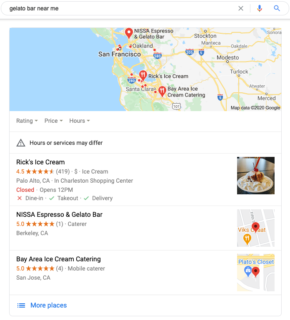Small businesses have a few big tasks to tackle so customers can find them online. One of their first action items is mastering Google My Business.
Today’s consumers turn to their phones to find the nearest services, from a real estate attorney to a gelato bar. And the businesses that put the most effort into their Google My Business listings and nurture their online reviews are the ones most likely to pop up in the top search results.
But before we get too far ahead of ourselves, let’s define some key terms every small business needs to know. Then, you can put in the back-end work so you can get better results on Google search.
8 Google Terms Defined
Google My Business Listing. Often called GMB, this is a free service offered by Google to consolidate business information into one tidy listing. The best GMB listings will help consumers find a business on Google web search, where 86.86% of worldwide online searches occur.
The most complete — or “optimized” — GMB listings include a website link, business address (which populates directions, thanks to Google Maps), hours of operation, frequently asked questions, pricing, photos of the business, Google Posts, Google reviews and the business’s star rating.
Google Places and Google+. Earlier versions of Google listings that eventually became Google My Business, which launched in 2014.
 Local 3 Pack or Map Pack. Also referred to as “local pack” or “3 pack.” Google used to call it the “7 pack,” but dropped to the top three organic listings with the best, most complete Google My Business listings. Google may display these organic results below ads for other local listings.
Local 3 Pack or Map Pack. Also referred to as “local pack” or “3 pack.” Google used to call it the “7 pack,” but dropped to the top three organic listings with the best, most complete Google My Business listings. Google may display these organic results below ads for other local listings.
In the example pictured, Rick’s Ice Cream gets the top spot since the business includes a variety of information: Star rating, price range, category, location, hours and options, such as dine-in, takeout and delivery, which today’s consumers want to know.
Google Posts. Businesses can create social media-style posts right on their GMB listing. (Thryv users can create Google Posts on their Thryv social media portal, along with their other social media posts.)
Google Posts is a vastly under-utilized tool. Through these Posts, searchers get more information when they click on the search result listing. The posts appear under the address and contact information. Businesses can use them in the same manner as, for instance, a Facebook post. They can post events, promotions, updates, product launches and more.
As with any good post, they should include a photo, description and call-to-action, like “learn more” or visit the website or physical location. Google Posts are an ideal way to keep a GMB listing fresh with new content, which Google also rewards with higher search ranking. Also, Google Posts disappear after 7 days, unless they are time-sensitive, such as an event. If you use the Products Post feature, posts will remain on your listing.
Google Guaranteed. This is a badge that shows up on some Google search results with a white check mark in a green circle. Businesses must purchase Google Ads to apply for the badge. Google will screen the business for qualification into the program. If a customer comes to the business through Google and isn’t satisfied with the service, Google might refund what they paid (up to $2,000). Google works with the business owner to investigate and resolve the case.

Reserve with Google. A relatively new service, Reserve with Google allows consumers to reserve a table or book a service appointment right from the business’s Google search results. For now, Google is limiting this service to dining, ticketed events, fitness and beauty. It’s an added online convenience for these types of businesses, and also integrates with Thryv’s online scheduling.
Local Citations. Not the bad kind of citation. This term simply refers to any online listing that includes a business’s name, contact information, address, description, and more. It’s important to be aware of any local citations about your business so you can ensure they are accurate.
GMB is a prime example, along with Facebook, Yelp, Yellow Pages and Bing. Citations can also refer to mentions in a blog or a local organization, such as the Chamber of Commerce. Thryv users input their current information once into their dashboard, and their listings are immediately updated across more than 60 online listings pages. Learn more.
GMB Insights. What good is all this work if you cannot measure what’s working? Google My Business Insights reports how many people viewed your listing; how and where they found it; any actions they took from your listing (visiting your site or calling your business, for example); and any other actions, such as clicking a Google Post or requesting directions.
What other terms or definitions would help you as you set up your Google My Business listing? Tell us in the comments below and we’ll follow up!





